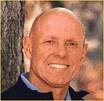
 | Stephen R. CoveyIncrease
your effectiveness at work and at home by practising these seven habits.
|
Stephen R. Covey Quotes Click on "Thought for the Day" below for an inspiring Stephen Covey quote to appear in a new window Bet you can't click it just the once! There
is a gap between
stimulus and response Love - the feeling - is a fruit of love, the verb Effective leadership is putting first things first. Effective management is discipline, carrying it out. Begin with the end in mind. If we keep doing what we're doing, we're going to keep getting what we're getting. Live out of your imagination, not your history Management is efficiency in climbing the ladder of success; leadership determines whether the ladder is leaning against the right wall. Seek first to undersand and then be understood If the ladder is not leaning against the right wall, every step we take just gets us to the wrong place faster How different our lives are when we really know what is deeply important to us, and keeping that picture in mind, we manage ourselves each day to be and to do what really matters most To focus on technique is like cramming your way through school. You sometimes get by, perhaps even get good grades, but if you don't pay the price day in and day out, you'll never achieve true mastery of the subjects you study or develop an educated mind. In the last analysis, what we are communicates far more eloquently than anything we say or do. The 7 Habits of Highly Effective People  Covey's
claim is confident and bold. It is that he has discovered seven habits,
which
if learnt and practised, will make you a highly effective person, at
home and
at work. In all
spheres of your life
you will “replace
old
patterns of self-defeating behaviour
with … new habits of effectiveness, happiness and
trust-based
relationships”
(p. 61). One
set
of habits covers everything. Here are Covey’s
seven habits: Habit
1. Be Proactive Take
initiative and responsibility. Habit
2. Begin with the end in mind Develop
and focus on your vision and values. Habit
3. Put first things first Organise
and execute around the most important relationships and results in your life. Habit
4. Think win/win Seek
mutually beneficial, win/win agreements and solutions. Habit
5. Seek first to understand, then be understood Try
to feel and think yourself into another person's shoes whilst they are
talking.
Only then try to make your own viewpoint be heard. Habit
6. Synergise The
whole can be greater than the sum of the parts. Compromise is 2+2=3.
Synergy is
2+2=5 - or more! Habit
7. Sharpen the saw Preserve
and
renew yourself - in your physical,
mental, social/emotional and spiritual dimensions. Habit
1 – Be Proactive Your proactivity lies in
choosing
how to
use the gap between stimulus and response The
first, most fundamental of Covey’s seven habits, without
which you
cannot hope
to master the other six and reach the holy grail of effectiveness, is
proactivity. But
the term proactivity
is rather misleading. Covey’s notion of proactivity is a lot
richer
than in
common parlance, which equates ‘proactivy’ with
‘taking the
initiative’. For
Covey taking the initiative is merely the beginning of proactivity.
Covey
relates how he discovered the essence of proactivity whilst he was working as an
academic in Hawaii
(p.309).
Whilst browsing through a psychology book in a college library, one
paragraph
leapt out at him. It contained the idea that, for human beings but no
other
animal, there is a gap between stimulus and response. How you use this
space is
the key to our growth and happiness. Whatever
your ‘programming’, a normally functioning human
being has the capacity
to rise
above it. Whatever the weather, you can carry your own weather with
you.
Whatever impulse you have, you can choose to ignore it and act on a
carefully
selected value instead. Bookmark this page to read more on the 7 habits ..... Stephen Covey's Home Page - includes Covey's own recommended reading list Wiki article on Covey  -good summary, mentions
criticism that some think Covey too idealistic
-good summary, mentions
criticism that some think Covey too idealisticMichael Gray's good summary of the 7 Habits Interesting 1999 Covey interview by Bob Rosner More recent 2004 interview from USA Today Peter Cooper's interview with Covey . Peter introduced me to Covey's work, so I have a lot to thank him for. Read more free Personal Development articles on Tim LeBon's pages |